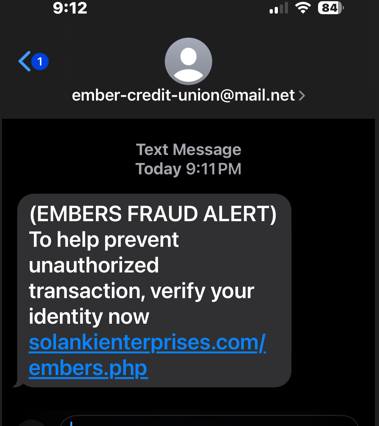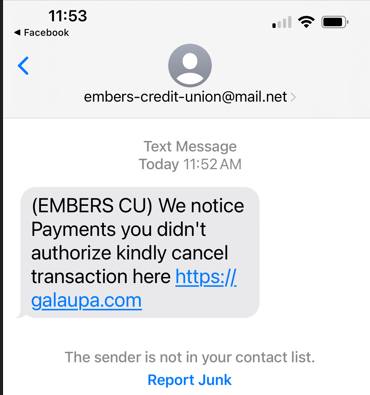
Fend Off Fraudsters
One in ten adults falls victim to a scam or fraud yearly. We at Embers want to keep you protected, informed, and secure. On this page, we'll keep you up-to-date with the latest financial scams we are seeing!
Hey Embers Members!
One in ten adults falls victim to a scam or fraud yearly. We at Embers want to keep you protected, informed, and secure. On this page, we'll keep you up-to-date with the latest financial scams we are seeing!
Fraud Update: 10/31/23


FRAUD UPDATE: 9/15/23
Did you know that Puppy/pet scams are one of the most common scams we see?
We all love our pets, and it's hard to resist the cute face of a puppy in a picture that's "proof" that the transaction is legitimate.
If you want to purchase a pet you found online, here are some telltale signs that it's a scam and tips to remember before you wire away your money.
- Check the process. Research the breed you are purchasing - if the price is too reasonable to be valid for a purebred teacup puppy, it's likely not real.
- Do your research. Only purchase from reputable dealers.
- Only buy after seeing the pet in person. If that's impossible, request a live video call with the pet and breeder.
- Conduct a reverse image search of the picture of the pet. If the same picture appears on other websites, it's likely a scam. You can also search for distinctive text from ads or testimonials to see if it's copied from another website.
- Use a secure payment method such as ACH: consider if the transaction makes sense. No real merchant asks you to buy gift cards for them.
FRAUD UPDATE: 9/7/23
One way you can get scammed is by a phishing attack, which is when a cybercriminal sends you an email, message, social media post, or text that includes a malicious download or link. If the hacker can trick you into clicking, you risk downloading remote viewing software like anydesk, losing control of an account, or becoming held hostage by ransomware.
Here are some common signs of a phishing message:
-An offer that's too good to be true.
-Includes language that's urgent, alarming, or threatening.
-Poorly crafted writing riddled with misspellings and bad grammar.
-The greeting is ambiguous or very generic.
-Includes requests to send personal information.
-Stresses an urgency to click on unfamiliar hyperlinks or attachments.
-A strange or abrupt business request.
-The sender's email address doesn’t match the company it's coming from. Look for little misspellings like pavpal.com or anazon.com.
FRAUD UPDATE: 8/28/23
Another rising trend in the fraud world has been remote access. Many of our reported incidents have involved scammers instructing members to download a remote access app on their device to allow them to screen share as the member logs in to online banking. It’s also easy to fall for an Amazon phishing text scam, where the fraudster instructs you to download a remote access app to your device.
Never share your password, screen, or online banking, and answer suspicious texts with anyone, even us.
